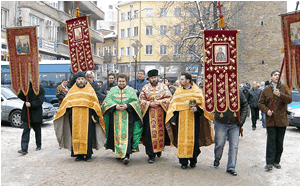 |
Theophany Crucession* Gabrovo, Bulgaria |
There are effectively two branches of Orthodox Christianity: the Greek Orthodox Church and those churches born through Byzantine missionary activity, i.e. the Armenian, Eritrean, Ethiopian, Coptic, Russian, Syrian and some Indian congregations. Differing slightly in liturgical practices and iconography, these churches are known as Eastern or Oriental Orthodox.
In the fourth century CE, Pope Julius I set the date for Christmas to 25 December in order to provide continuity from year to year and in an effort to replace the festival of the pagan sun-god Mithras. Although many of the Orthodox churches have celebrated Christmas in December since the middle of the fifth century, some chose to keep their festivities on the traditional date for Epiphany.The birth of Christ, often known as Theophany (Gr. ‘vision of god’) or the Feast of the Nativity, is observed by Armenians on 6 January and by other Eastern Orthodox on 7 January; to complicate matters some Armenians, particularly those following the Patriarch in Jerusalem, follow the old Julian calendar, in which case the festival is observed on January 19th.
The Armenian church tends to place great importance on Epiphany and Christ’s baptism. Therefore after a mass honouring his birth there is a blessing of water, and then a cross is dipped into the holy water to symbolise his baptism. They traditionally eat a meatless omelette called coocoo/kuku which is made with spinach, onions, and corriander, lots of yoghurt, and a special type of salted fish known as dasbeech/mahidudi.
Russian families have a meatless dinner called the holy supper which includes a special type of porridge (kutya) as the main dish: the ingredients of the kutya are symbolic, grains for hope, and honey with poppy seeds for happiness and peace. In Ethiopia, everyone goes to church on Christmas Eve wearing a new outfit. The service ends at midnight with the ringing of church bells; following this a meal known as fata is eaten, consisting of bread, rice, garlic and boiled meat.
Read more about Christmas Eve and Christmas.